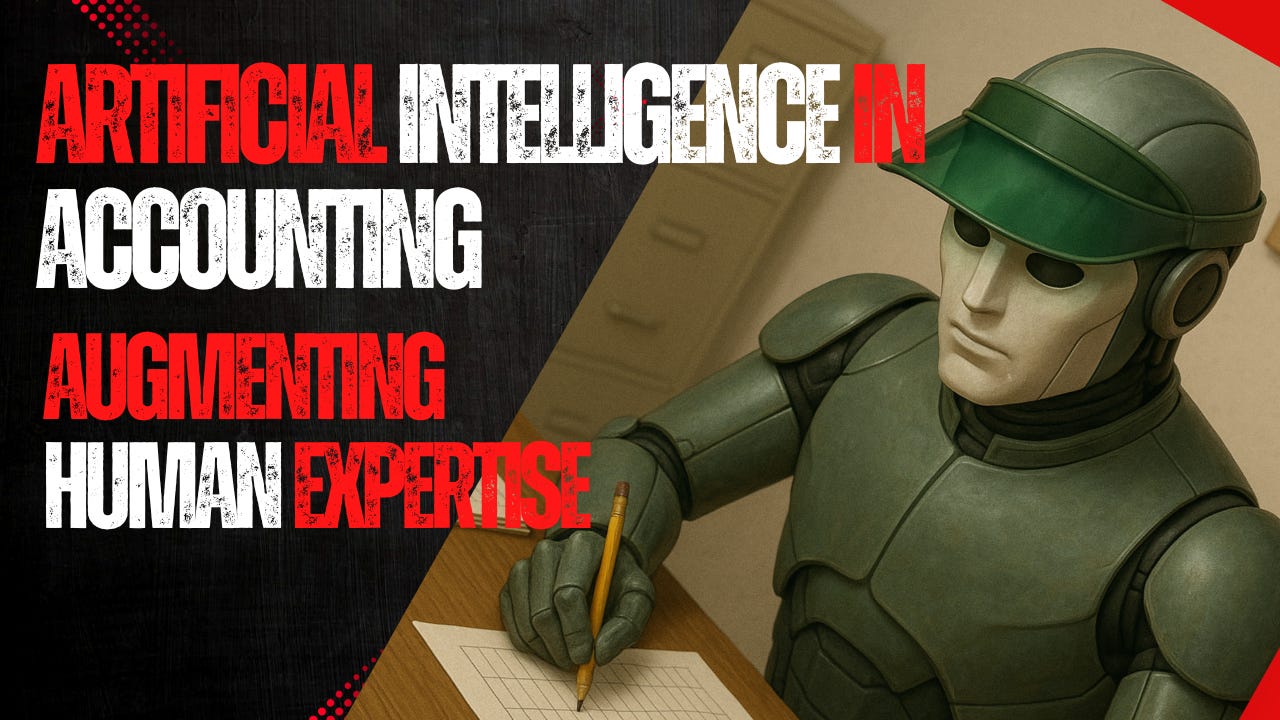AI in Accounting: Augmenting Human Expertise
How a Stanford–MIT Study Shows Generative-AI Elevating Accountants, Not Eliminating Them
“Wait—I Thought Accounting Was Doomed?”
Scroll through nearly any “jobs most likely to be automated” list and accounting is probably sitting right near the top. It seems obvious: predictable inputs, clear rules, mountains of repetitive data entry. Who wouldn’t hand it over to an algorithm?
But a study from Stanford and MIT Sloan tells a different story. By embedding themselves in 79 real-world firms and surveying 277 working accountants, the researchers found that AI is reshaping the profession.
Inside the Study: Real Firms, Real Deadlines
Participants: 277 accountants across experience levels
Dataset: Task-level logs from 79 small- and mid-sized practices already using generative-AI bookkeeping tools
Focus: How AI affects speed, workload mix, and output quality
Instead of hypothetical forecasts, the team pulled live usage data, everything from bank-feed imports, invoice tagging, reconciliation runs, to month-end closes. In short: everything you’d probably call “the grind.”
Finding #1 – Seven and a Half Days Back in Your Month
Firms running AI finalized their monthly financial statements 7.5 days faster on average. That’s an entire week reclaimed for higher-level work, client consults, or actual breathing room.
Overall, “back-office drudgery” dropped 8.5 % per month.
Finding #2 – Faster and Better? Yes, Actually.
Conventional wisdom says speed and quality have an inverse relationship. The study blew that up:
Reporting granularity up 12 %—the AI surfaced richer sub-accounts (bonuses, benefits, commissions) instead of one lump-sum “payroll” line.
Error detection: Models flagged low-confidence entries, cueing humans to review the riskiest edges of the data.
Translation: Clients get cleaner, more insightful reports; auditors get clearer paper trails; accountants spend less time hunting for mis-classifications after the fact.
Finding #3 – Experience Multiplies the Upside
AI didn’t flatten the talent hierarchy; it amplified it.
The takeaway is simple: human judgment still rules. AI can crunch, classify, and draft, but it can’t shoulder professional skepticism. Yet.
What Accountants Think
62 % worry about AI errors.
43 % cite data-security concerns.
37 % admit to job-stability anxiety.
Yet:
48 % say AI already helps them hit deadlines and improve accuracy.
65 % rank “automating routine tasks” as the single biggest upside.
In short, concern and optimism coexist, much like every other technological leap in business history.
What’s Still Human Territory
Auditing judgment calls – interpreting ambiguous evidence, applying professional skepticism.
Complex tax strategy – balancing ever-shifting regulations with unique client circumstances.
Business valuation – weighing qualitative factors, market narratives, and negotiation dynamics.
AI can synthesize standards and summarize documents, but final sign-off remains human.
Beyond Accounting: A Template for Other “Automatable” Professions
If AI can transform a field once viewed as spreadsheet drudgery into a strategy-and-advice powerhouse, consider the ripple effects:
Legal research → legal strategy
Compliance checks → risk advisory
Radiology scans → integrated diagnostics
Wherever tasks are “boring but necessary,” the pattern may repeat: automate the rote, elevate the role.
The accountant isn’t dead; they’re becoming indispensable in new ways. Yes, AI handles the bean-counting faster and finer. But the meaning of those bean still demands human insight.
And that might be the most encouraging lesson of all: technology can free us from the mundane, but it still needs us for the meaningful.
Have thoughts on AI in your own workflow? Drop a comment—I read every one.
Watch on YouTube, or listen on Spotify.





